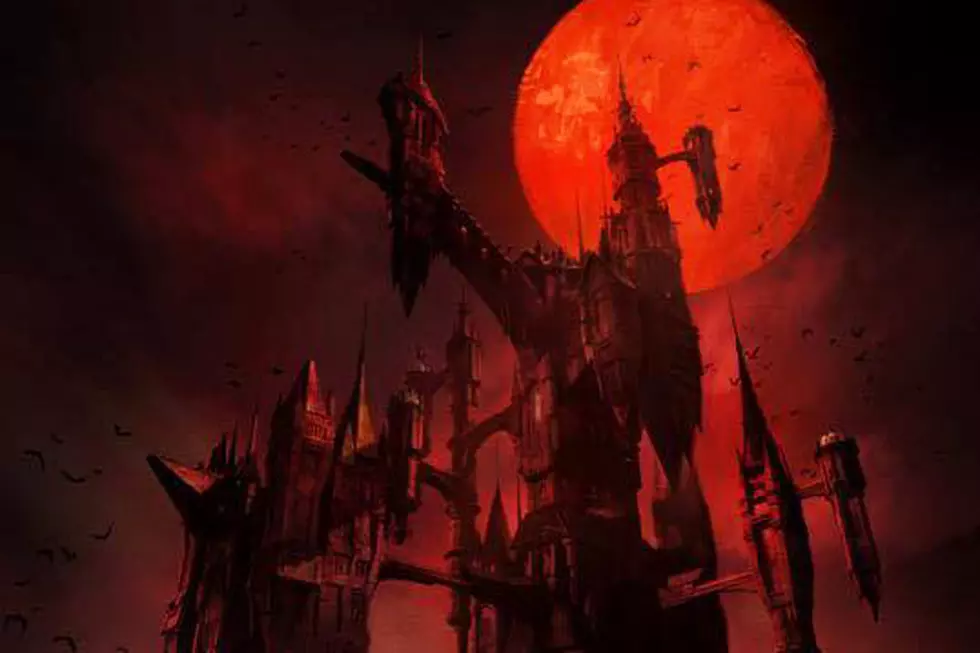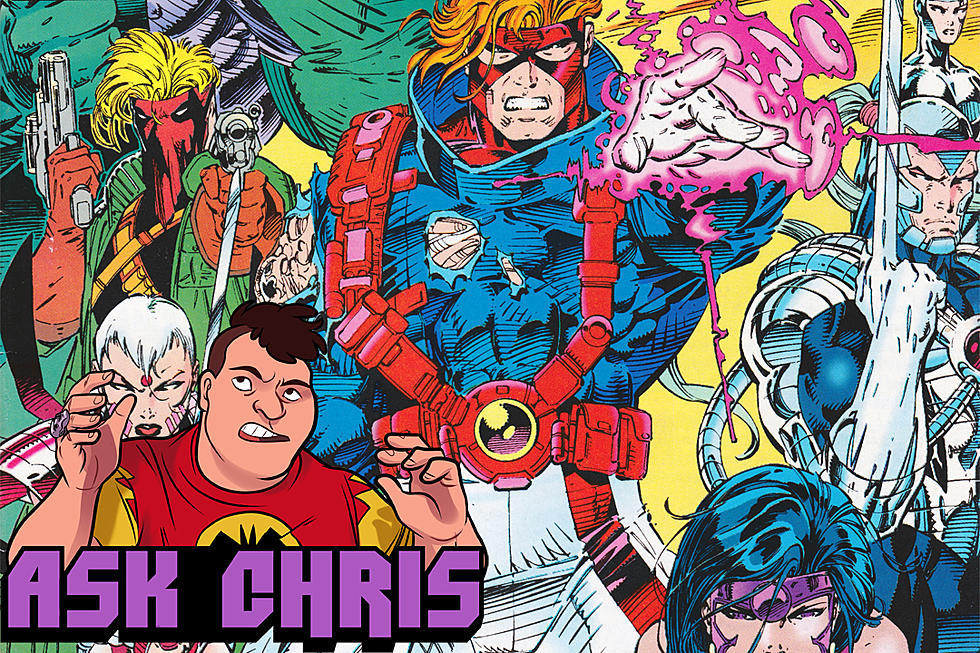
‘Planetary': Digging up the Bones of the Genre Comic
 "There are mad and beautiful things beneath the skin of the world we know, that you only see when you look at things on a planetary scale..."
"There are mad and beautiful things beneath the skin of the world we know, that you only see when you look at things on a planetary scale..."
-- Warren Ellis, from the original "Planetary" proposal
With this week's publication of "Planetary" 27, one of the most articulate and influential superhero comics of the last decade finally spirals to its strange end.
And after ten years, six-hundred-some pages, four Eisner nominations and two extended hiatuses, it's finally time to Indian-leg 'round the story circle and sift through the meat and bone of its magnificent remains.Written by Warren Ellis and illustrated by John Cassaday, "Planetary" debuted (after a short backup preview) in 1999 to near-instant critical acclaim. Like most Ellis comics, it threw the reader into the deep end immediately, and demanded that one make room in their head for big ideas. Though he sometimes writes his protagonists with his own voice (probably why the word "bastard" appears no less than eleventy-thousand times), it's an engaging one, and the series hums with the same language that just seems to bleed out of Ellis: bitingly funny one moment, savagely violent the next, and poignantly emotional to finish. The art is consistently inventive and engaging, and inexplicably better with every issue. Over the breadth of the series, Laura Martin (nee' Depuy) firmly establishes herself as one of the most respected colorists in comics, and Cassaday blossoms into a genuine comic book superstar.
And the concept just pops. Set in the WildStorm universe, the titular "Planetary" organization works to unearth and protect one-hundred years of superhuman history that nobody knew existed. The Drummer, Jakita Wagner, and the mysterious Elijah Snow are the field team, super-powered Archaeologists of the Impossible out to pull back the shroud of ignorance that hangs over their strange world.
Throughout "Planetary," the sordid origins of the superhero sub-genre are autopsied and laid out on the table. Ellis and Cassaday switch styles and genres with startling ease, plumbing the depths of genre fiction to its earliest roots and hitting all points in between. Pulp stories, serial westerns, Victorian horror, Vernian sci-fi, spy novels: Each has its place in the formation of the American superhero, so each has its place in "Planetary." Through clever use of analogue characters, measured, particular storytelling, and chameleon-like design, the reader is drawn through a kaleidoscope of genre possibilities for the medium, and an extended dissertation on the evils of superhero dominance.

The first issue of "Planetary" sees the field team called to a disturbance in the Adirondack Mountains, where the first pieces of superhero history are revealed. In the 1940s, a group of pulp adventurers – based on Doc Savage, The Shadow, Fu Manchu and others – saw the savagery and horror of WWII and decided that the world was wrong and that it needed to be fixed. From their secret headquarters in the mountains, they built "the Brain," a computer that operated on a construct of alternate realities, represented as a 196,882-dimensional snowflake (based on the mathematical Monster group), in an attempt to make the best possible world. In doing so, they inadvertently opened a doorway through the Bleed, the membrane that separates parallel worlds.
As "the Brain" performs its computations, one virtual world after another falls until the super-powered denizens of one reality, a version of the JLA, pass through to stop the destruction of their world, killing all the pulp heroes save one. In making the mirror-JLA's very existence possible, the pulp heroes essentially sign their own death warrants.
Despite the obvious metaphor for comics history, there's an interesting metafictional theme unique in Ellis's canon. While Ellis has often been compared to fellow Brit Grant Morrison, he has rarely dipped his toes into the waters of the self-aware story. In "Planetary," though, there are subtle nudges in that direction: midway through the series, Snow and the others come to believe that though they perceive reality in three dimensions, they are in fact living on a two-dimensional plane of information within a 3-D field.
Kind of like a comic book, right?
The "Planetary" organization's adversary is The Four – a quartet of space adventurers who ventured into the Bleed in 1961 and returned empowered, a bent mirror held up to the Fantastic Four. The Four are the secret architects of the world, and they have dug up, covered up, manipulated and obliterated every wild secret that they can find. Because of them, nobody knows that man was in space in the 1800s, that science adventurers saved the world from alien invaders in the thirties; that in some parts of the world giant moths litter the sky.
You can practically feel the hot breath of commentary on the back of your neck, can't you? Just as the Four feed off of and hide their world's rich history, the superhero genre dominates the mainstream market, taking liberally from its contemporaries and antecedents while simultaneously blocking their exposure. It's a pretty apparent allegory, but done well, and important.
If "Planetary" really is an argument, Ellis is winning. Since the superhero boom of the golden age, the genre has dominated the format and nearly destroyed it. Why rely so desperately on one sub-genre when there are so many other possibilities? Superhero comics can be great, and will continue to be great – there are only so many pearls out there, but it's a big beach, and mostly sand. And if the energy and vibrancy of the genre explorations in this series is any indication, there are worlds worth of possibilities far beyond the cape-and-cowl set, all of them worthy of exploration.

So is "Planetary" anti-superhero? Not necessarily. Ellis has long espoused his distaste, and sometimes outright hatred for the superhero – this is the man who wrote "Ruins," and coined the phrase "pervert suit," after all. But calling Planetary anti-superhero is an oversimplification. While there is the very clear message that they may be choking the very life out of the medium, through his dissection of the disparate elements that have come together in the superhero genre, Ellis is able to shine a light on that which makes the concept so great – the wondrous utopian heart that makes it go.
In one of the most memorable stories from the series, issue ten's "Magic and Loss," alternate versions of three iconic DC characters are presented – Superman, Wonder Woman, and Green Lantern – reduced to their base elements and filtered through Ellis's post-modern prism. And in three very short, poetic sequences, all the messy layers of fan expectation and shifty continuity are peeled away to reveal that which makes them truly interesting: their foreign-ness, and the spirit of hope for a better world that each represents.
Over the years, Warren Ellis has threatened several times to leave superheroes behind for good, even before "Planetary" came along. Officially, though, it was meant to be his swan song. From his interview for "Writers on Comics Scriptwriting": "...that will be the last superhero project I do. Once 'Planetary' is complete, that's it, I'm out of the genre. 'Planetary' is designed to say everything I have left to say about superheroes."
Of course, at the time that interview was completed, it was thought that "Planetary" would last about three years, he had not yet completely revived Iron Man for Marvel, and was still publishing titles under DC Vertigo. Times change, people too. But now that issue 27 is out, after his current commitments, will Ellis really be giving up the genre for good?
My gut says no. The financial reality is just
too overwhelming – Ellis will always be in high-demand to jump on a superhero title for a few months and revamp it, and that's where the money is. Everybody needs to make a living.
But more than that, my hope says no. For all his criticism of the genre, and in fact because of it, Ellis will be remembered as one of the most insightful and influential tellers of the superhero story for quite some time, and as of right now, "Planetary" is the brightest star in his sky. There are far too few pearls in the sand, and he is far too good at finding them.
The superhero world can be a strange one. Somebody needs to keep it that way.
More From ComicsAlliance

![Jenny Sparks Enters The Scene In Ellis And Davis Hunt’s ‘The Wild Storm’ #3 [Preview]](http://townsquare.media/site/622/files/2017/03/TWS_Cv3_000.png?w=980&q=75)

![A New Team Bands Together In ‘Black Panther & The Crew’ #1 By Coates, Harvey, And Guice [Preview]](http://townsquare.media/site/622/files/2017/03/Black_Panther_The_Crew_1_Featured.jpg?w=980&q=75)





